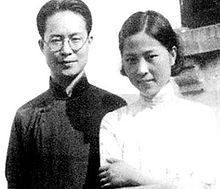- Shen Congwen
-
Shen Congwen 
Shen Congwen and his wife Zhang ZhaoheBorn 28 December 1902 Died 10 May 1988 (aged 85) Alma mater Peking University Influenced by Yu Dafu, Xu Zhimo, Lin Zaipin Spouse Zhang Zhaohe, married on 9 September 1933, widowed on 10 May 1988 (54 years, 244 days) Shen Congwen (simplified Chinese: 沈从文; traditional Chinese: 沈從文; pinyin: Shěn Cóngwén; Wade–Giles: Shen Ts'ung-wen, December 28, 1902—May 10, 1988) was the pen name of a Miao Chinese writer from the May Fourth Movement. He was known for combining the vernacular style of writing with classical Chinese writing techniques, and his writing also reflects a strong influence from western literature. He was born as Shen Yuehuan (沈岳煥) on 1902 December 28 in Fenghuang County (凤凰县) in Hunan Province. He died on 1988 May 10 in Beijing. He is described as "a novelist, short-story writer, lyricist and passionate champion of literary and intellectual independence.... Although almost entirely unknown to Western readers, Mr. Shen's oeuvre, much of it embued with the folklore and customs of his native western Hunan, has been compared to that of William Faulkner."[1]
Shen was initially trained for a career in the military. As a soldier in the Chinese army, he observed border fighting and the lives of the Miao tribesmen, which later became the subject matter of his early short fiction stories. He began writing fiction in 1922 and wrote almost continually until 1949. He taught Chinese literature at various universities during the Second Sino-Japanese War out of monetary necessity.
Originally an apolitical writer, he suffered a breakdown after the Communist Revolution in 1949 and the subsequent restrictions on writing. He recovered by 1955, but he never again published another work of fiction. He was given a staffing post at the Palace Museum at the Forbidden City in Beijing, about which he wrote a non-fiction work in 1957. Afterwards, he also published a famous study of Chinese costume and dress.
Changhe (长河, “The Long River”), written during the Sino-Japanese War, is generally considered the best of his long fiction. Chundeng Ji (春灯集, “Lamp of Spring”) and Heifeng Ji (黑凤集, “Black Phoenix”) are his most important collections of short stories. "The Border City", also known as "The Frontier City" (《边城》拼音:Bian Cheng) is considered his masterwork,a beautifully written pastoral ode to love. This novel has been translated into nine different languages. It is now possible to visit his former residence in Fenghuang County.
References
- ^ Gargan, Edward A. (13 May 1988). "Shen Congwen, 85, a Champion of Freedom for Writers in China". New York Times. http://www.nytimes.com/1988/05/13/obituaries/shen-congwen-85-a-champion-of-freedom-for-writers-in-china.html. Retrieved 12 September 2009.
External links
- Encyclopædia Britannica 2005 Ultimate Reference Suite DVD, article- "Shen Ts'ung-wen"
Categories:- Chinese writers
- Chinese-language writers
- 1902 births
- 1988 deaths
- Peking University faculty
- People from Xiangxi
Wikimedia Foundation. 2010.
